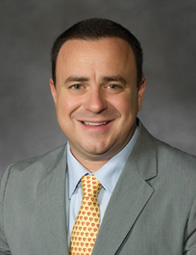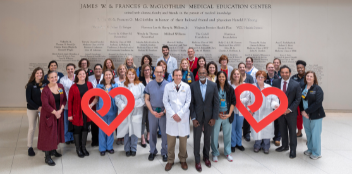Guidance on Broken-Heart Syndrome
 Dr. Antonio Abbate
Dr. Antonio Abbate
A team of cardiology and psychiatry specialists from VCU Health has authored a new comprehensive clinical review article in the Journal of the American College of Cardiology that summarizes the latest evidence-based diagnostic criteria and treatment strategies for Takotsubo cardiomyopathy, also known as broken-heart syndrome.
“Takotsubo cardiomyopathy is a recently recognized condition that is difficult to diagnose and treat,” said corresponding author Dr. Antonio Abbate, a professor of cardiology, associate director of the C. Kenneth and Dianne Wright Center for Clinical and Translational Research and medical director of the Clinical Research Services Unit.
In the state-of-the-art review—the most prestigious type of literature review—the interdisciplinary research team summarized all that is known about the condition, reviewing the proposed risk factors and triggers for the syndrome and discussing practical approaches to diagnosis and treatment. They also highlighted potential challenges and unresolved questions.
The researchers plan to use the Wright Center’s research-dedicated MRI scanner to further explore the brain-heart connection in patients who present with the condition, and to explore the link to cannabis.
The disease, described as a weakening of the heart’s left ventricle, usually results from severe emotional or physical stress such as the death of a loved one. More than 90 percent of reported cases are in postmenopausal women—ages 58 to 75—who experienced severe, unexpected emotional stress one to five days before the onset of symptoms. The condition is reversible, but often misdiagnosed, and can lead to stroke and death. Asthma, depression and substance abuse—including cannabis use—are also risk factors. “In the article, we discussed that some part of the brain may be overactive in response to an emotional or physical stressor,” Abbate said.
The review builds on existing VCU research conducted by co-author Dr. F. Gerard Moeller, director of the Wright Center, including reports on complex cases of Takotsubo cardiomyopathy at VCU Medical Center and preclinical studies that highlight the interplay between the brain and heart. The researchers plan to use the Wright Center’s research-dedicated MRI scanner to further explore the brain-heart connection in patients who present with the condition, and to explore the link to cannabis.
In the meantime, the JACC review will be available to providers worldwide and may help guide diagnosis and treatment.
Back to Spring-2019The researchers plan to use the Wright Center’s research-dedicated MRI scanner to further explore the brain-heart connection in patients who present with the condition, and to explore the link to cannabis.


